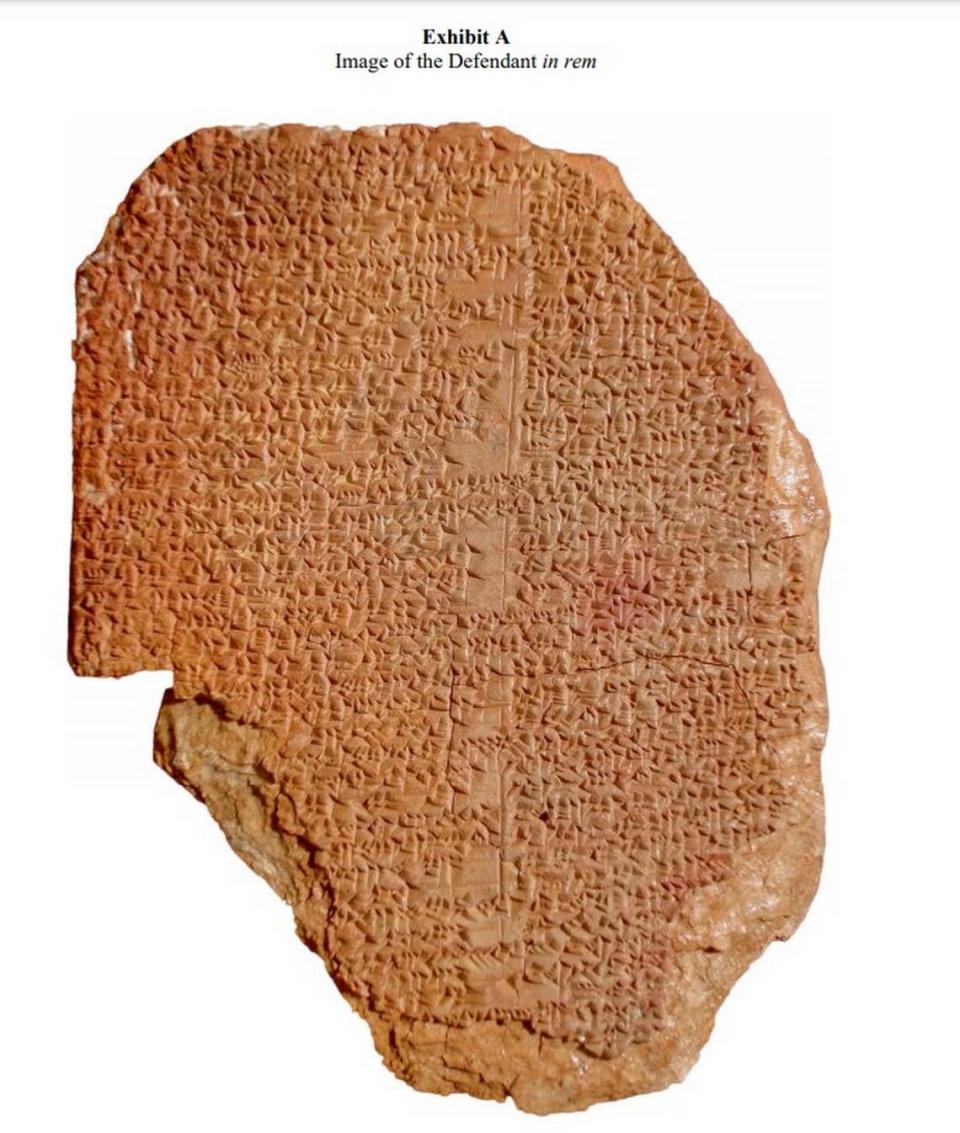Hobby Lobby bought ancient stolen tablet with tale of Gilgamesh. The feds are taking it
A dirty clay tablet inscribed with one of the world’s oldest poems was looted from Iraq, smuggled into the U.S. and turned over to a London auction house before it landed in the hands of a large arts and crafts retailer for the purchase price of $1.7 million.
Now the federal government is taking it.
A federal judge in the Eastern District of New York ordered Hobby Lobby on Monday to give up the rare cuneiform tablet bearing a portion of the Epic of Gilgamesh. The retail giant had bought the tablet for the Museum of the Bible in Washington, D.C., where it was seized in 2019.
How it got there and the several hands it passed between over two decades is what’s at issue in the government’s case.
The tablet’s travels
Prosecutors traced the tablet’s origins in the U.S. to an antiquities dealer who bought it from a Jordanian coins dealer, Ghassan Rihani. According to the government’s complaint, the dealer first viewed it on the floor of a London apartment in 2001.
Rihani died the same year, prosecutors said, but in March 2003, the antiquities dealer met with Rihani’s family to see the tablet again. It was grouped with several other cuneiform tablets that had not been conserved and were difficult to read.
The writing, however, indicated it was literary.
Prosecutors said the dealer believed the tablets could be of some value and paid $50,350 for them. They were reportedly shipped to the U.S. without filing a formal entry with U.S. Customs, as is required for items costing more than $2,000.
One of the tablets that had been illegible and covered with dirt was cleaned when it arrived in the U.S. That’s when they discovered it was part of the Epic of Gilgamesh, court filings state.

The tablet spent some time being studied by a professor in Princeton, New Jersey, before it was sold to two antiquities buyers for $50,000 in 2007, prosecutors said. At the time of its sale, the antiquities dealer who first purchased it in London created a fake provenance letter stating it had been bought at auction in 1981.
That letter “traveled with the tablet as it was sold several times in different countries,” prosecutors said.
In December 2013, the tablet was passed to an international auction house in London for private sale. Hobby Lobby bought it for $1.7 million in July 2014 and gave it to the Museum of the Bible.
When the museum was arranging to receive the tablet, prosecutors said, it asked for the 1981 auction listing and was told the auction house no longer had record of it.
Three years later, in 2017 as the museum was preparing to open, a museum curator started asking questions about the tablet’s provenance and previous ownership. It turned out they could not verify that the item had been in the U.S. since 1981.
The government’s case
Agents with the Department of Homeland Security seized the tablet from the Museum of the Bible on Sept. 24, 2019, and gave it to U.S. Customs and Border Protection for safekeeping.
Prosecutors said it’s currently being stored in Brooklyn.
The government filed a complaint for forfeiture in June 2020, saying the tablet had been brought into the U.S. illegally and was “stolen Iraqi property.”
Hobby Lobby then filed a claim of ownership interest in the case, court documents show.
Defense attorneys and a representative for Hobby Lobby did not immediately respond to McClatchy News’ request for comment on Wednesday, but prosecutors said the company consented to the forfeiture.
A judge signed the order Monday.
It’s not the first time Hobby Lobby has been ensnared in allegations of antique smuggling.
The retailer is a Christian-based company headquartered in Oklahoma City that has a history of collecting biblical artifacts. In 2017, Hobby Lobby was ordered to forfeit thousands of artifacts and pay $3 million after the Justice Department said the items had been smuggled into the U.S. illegally, CNN reported.
What is the Gilgamesh tablet
The tablet, which measures 5 inches by 6 inches, is known as the “Gilgamesh Dream Tablet.” It depicts a scene from the Epic of Gilgamesh in which the protagonist, King Gilgamesh of Uruk, describes a dream to his mother that she interprets as the “foretelling the arrival of a new friend,” prosecutors said.
Gilgamesh’s story was written as a poem by the Sumerians, an ancient civilization in the Mesopotamia region, and centers on the friendship between Gilgamesh, a god and man, and Enkidu, an animal and man.
A modern translation of the poem begins with these lines.
“It is an old story
But one that can still be told
About a man who loved
And lost a friend to death
And learned he lacked the power
To bring him back to life.”
The epic was discovered in the 1850s in the ruins of the library of the Assyrian King Assur Banipal in Nineveh, situated in modern-day northern Iraq. It became of interest to Christians who saw parallels in the poem with Biblical stories — namely the great flood featured in the story of Noah’s ark.
There have been several copies or versions of the epic discovered on ancient cuneiform tablets in the century and a half since it was first unearthed.
But many of those types of tablets have been looted from Iraq since the early 1990s, prosecutors said.
Man sparked world-famous treasure hunt — now lawsuit says he kept bounty for himself
How NC pried its long-lost Bill of Rights from ‘Antiques Roadshow’ dealer 18 years ago
‘Priceless national treasures’ were smuggled into US, feds say. They’ve been returned

 Yahoo Movies
Yahoo Movies 
